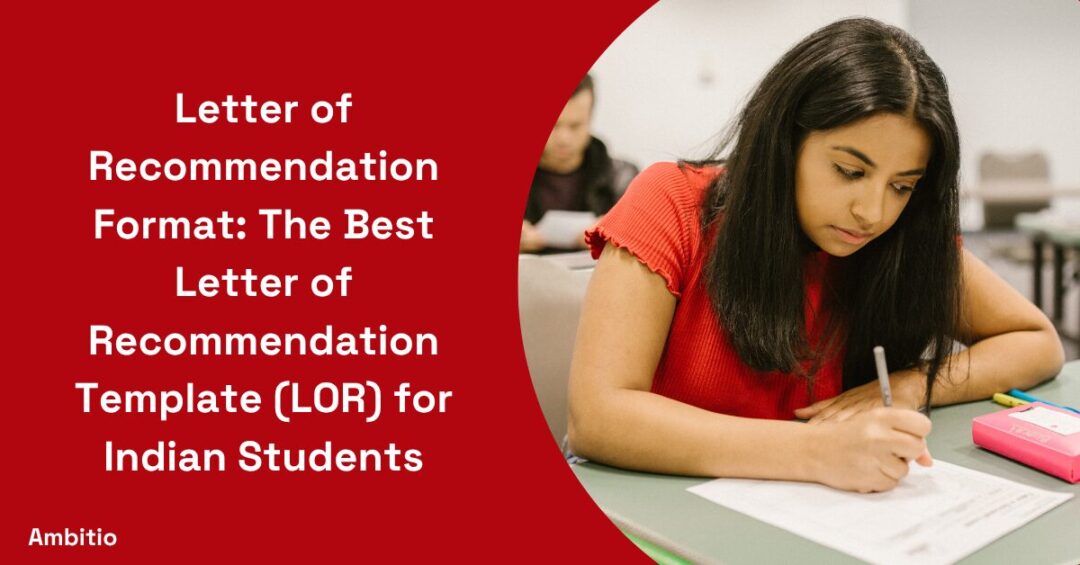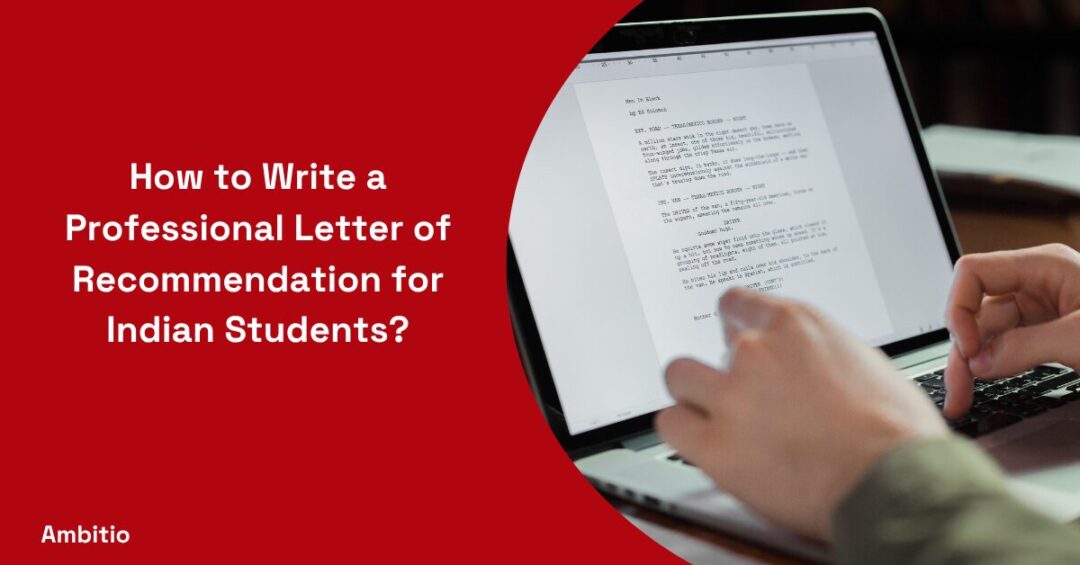13 December 2024
5 minutes read
A Guide to Academic Letter of Recommendation Format

Introduction
A letter of recommendation is a crucial document that helps in building a strong application for admission to universities or for job applications. Whether you are a professor, a teacher, or a professional, understanding the academic letter of recommendation format is essential to provide a strong and effective recommendation.
A well-crafted letter of recommendation can make or break an applicant’s chances of admission or landing a job. This guide will provide you with tips for writing a good letter, a template to get started, and answers to frequently asked questions.
Academic Letter of Recommendation
An academic letter of recommendation, often referred to as an LOR, is a letter written by a teacher, professor, or professional who knows the applicant well and can vouch for their qualifications, skills, and character. It is often required for admissions to universities, particularly for study abroad programs, and job applications.
Why is an Academic Letter of Recommendation Important?
An academic letter of recommendation is an essential component of an applicant’s application package for several reasons:
- Provides an Outside Perspective: Admissions officers or hiring managers typically have a plethora of documents that provide an objective perspective on an applicant’s qualifications, such as transcripts, test scores, or a resume. However, a letter of recommendation provides a subjective view and offers insights into the applicant’s character, work ethic, and other intangible qualities that are not evident from the rest of the application.
- Validates Claims: Applicants often make claims about their abilities, achievements, and character in their application essays or interviews. A letter of recommendation from a credible source can validate these claims and provide evidence that the applicant possesses the qualities they say they do.
- Adds a Personal Touch: A well-crafted letter of recommendation can add a personal touch to an application and help the applicant stand out from the crowd. It shows the admissions officers or hiring managers that the applicant has strong relationships with their teachers, professors, or employers and is respected by others in their field.
- Gives Context to Achievements: A recommender can provide context to the applicant’s achievements and struggles. For example, they can explain if the applicant had to overcome any significant challenges to achieve their goals, which can make their achievements even more impressive.
- Shows the Applicant’s Fit: The recommender can provide insights into how well the applicant would fit into the program or job they are applying for. They can discuss the applicant’s passion for the field, their teamwork skills, or any other qualities that would make them a good fit for the program or organization.
- Influences Decision-Making: A strong letter of recommendation can have a significant influence on the decision-making process. It can tip the balance in favor of the applicant if the admissions officers or hiring managers are undecided. On the other hand, a weak or generic letter of recommendation can have a negative impact on the applicant’s chances.
In summary, an academic letter of recommendation is crucial because it provides a different perspective on the applicant, validates their claims, adds a personal touch to their application, provides context to their achievements, shows their fit for the program or job, and can significantly influence the decision-making process.
Therefore, it is essential to take the time to write a thoughtful and sincere letter of recommendation that accurately reflects the applicant’s abilities and character.
Key Components of an Academic Letter of Recommendation
- Introduction: Start the letter by introducing yourself and explaining your relationship to the applicant. Mention how long you have known the applicant and in what capacity.
- Body: This is the main part of the letter where you will provide specific details about the applicant’s qualifications, skills, and character. Use specific examples and anecdotes to support your claims. For example, if you are highlighting the applicant’s leadership skills, mention a situation where they demonstrated those skills.
- Conclusion: Sum up your recommendation and express your confidence in the applicant’s abilities. Provide your contact information in case the recipient has any further questions.
Tips for Writing a Good Academic Letter of Recommendation
- Know the Applicant: It is essential to know the applicant well to provide a detailed and sincere recommendation. Make sure you can provide specific anecdotes and examples of their character and skills.
- Be Concise: Keep your letter concise and to the point. A one-page letter is usually sufficient.
- Use a Professional Tone: Maintain a professional tone throughout the letter. Avoid using overly casual language or slang.
- Be Positive: Focus on the positive qualities of the applicant. If there are any weaknesses or areas for improvement, mention them in a constructive manner.
- Provide Specific Examples: Use specific examples to back up your claims about the applicant’s qualifications and character. This will make your recommendation more convincing.
- Address the Letter to a Specific Person: If possible, address the letter to a specific person, such as the admissions officer or hiring manager. This shows that you have taken the time to research the recipient and adds a personal touch to the letter.
Academic Letter of Recommendation Template
[Your Name]
[Your Title/Position]
[Your Institution/Organization]
[Your Phone Number]
[Your Email]
[Date]
[Recipient’s Name]
[Recipient’s Title/Institution]
[Recipient’s Address]
Dear [Recipient’s Name],
I am writing to recommend [Applicant’s Name] for [Purpose of Recommendation: e.g., admission to your undergraduate program, a job, etc.]. I have known [Applicant’s Name] for [Length of Time You’ve Known the Applicant] as [Your Relationship to the Applicant: e.g., teacher, supervisor, etc.].
In my time working with [Applicant’s Name], I have been consistently impressed with their [List of Positive Qualities: e.g., work ethic, dedication, problem-solving abilities, etc.]. [Applicant’s Name] is [Provide Specific Examples and Anecdotes that Showcase the Applicant’s Qualities].
In addition to their academic performance, [Applicant’s Name] has also excelled in extracurricular activities, [Provide Examples of Extracurricular Activities and Achievements].
I am confident that [Applicant’s Name] would be a valuable addition to your [University/Company/Organization] and highly recommend them for [Purpose of Recommendation]. If you have any questions or need further information, please feel free to contact me at [Your Phone Number] or [Your Email].
Sincerely,
[Your Signature]
[Your Name]
Conclusion
Writing an academic letter of recommendation is a significant responsibility that can have a considerable impact on an applicant’s future. Following the academic letter of recommendation format, providing specific examples and anecdotes, and maintaining a professional tone throughout the letter are crucial to crafting a strong and effective recommendation.
Remember, your recommendation can make or break an applicant’s chances of admission or landing a job, so take the time to write a thoughtful and sincere letter.
Frequently Asked Questions
What should be included in an academic letter of recommendation?
An academic letter of recommendation should include the following:
1) An introduction stating your relationship to the applicant and the length of time you have known them.
2) A body that provides specific examples and anecdotes of the applicant’s character, skills, and qualifications.
3) A conclusion summarizing your recommendation and providing your contact information.1
How long should an academic letter of recommendation be?
An academic letter of recommendation should be concise and to the point, usually no more than one page.
Can I refuse to write a letter of recommendation?
Yes, if you feel that you do not know the applicant well enough or cannot provide a positive recommendation, it is better to politely decline the request.

You can study at top universities worldwide!
Get expert tips and tricks to get into top universities with a free expert session.
Book Your Free 30-Minute Session Now! Book a call now




























